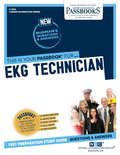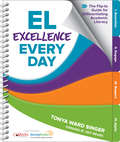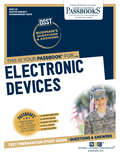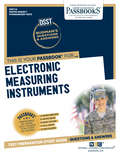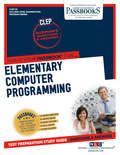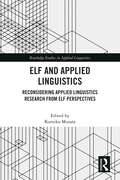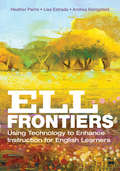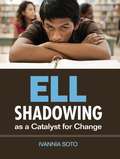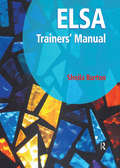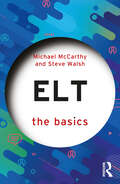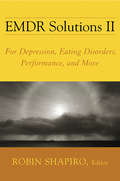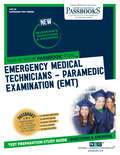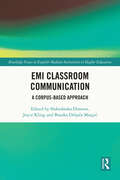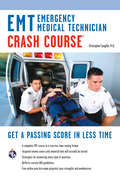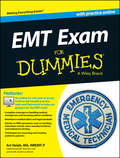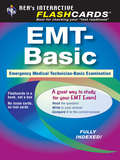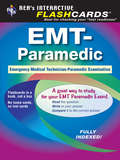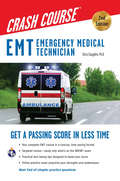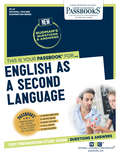- Table View
- List View
EKG Technician: Passbooks Study Guide (Career Examination Series)
by National Learning CorporationThe EKG Technician Passbook® prepares you for your test by allowing you to take practice exams in the subjects you need to study. It provides hundreds of questions and answers in the areas that will likely be covered on your upcoming exam, including but not limited to; Anatomy and terminology related to electrocardiography; Operation and maintenance of an electrocardiograph; Techniques involving in taking electrocardiograms; and more.
EL Excellence Every Day: The Flip-to Guide for Differentiating Academic Literacy
by Tonya W. SingerTake the Flip-to Book Tour! You have to see this book to believe this book. And once you use this book it will quickly become your most treasured teaching resource. What exactly is so remarkable? All of the best teaching tools in language and literacy are at your fingertips! Just flip to that strategy you want to learn or that literacy goal you want to reach for a wealth of ready-to-use resources to actively engage learners, build academic language, and strategically support literacy instruction. Much more than a resource for EL specialists, EL Excellence Every Day is written for every teacher, with a singular focus on improving the ways we all differentiate literacy instruction. Busy teachers especially will appreciate: Over 85 flip-to strategies that help you engage and support all learners 200+ prompts and linguistic scaffolds to facilitate academic conversations connected to specific literacy goals Lesson-ready resources for essential literacy goals: anticipate before reading, read to understand, read to analyze and infer, and write with text evidence Formative assessment tasks and if/then charts for personalizing teaching to every student Differentiation guides that demonstrate how to adjust supports across EL proficiency levels Intuitive, color-coded design so you can find what you need, when you need it No one lesson or strategy is ever the perfect solution for every student. No one student learns in the same way. If there’s one universal truth in teaching it’s that every child is unique. Devour this book and soon enough you’ll provide the excellent literacy instruction each and every student deserves each and every day. "We need resources that clearly and quickly help us to meet diverse instructional needs every day in every classroom. Tonya Ward Singer’s EL Excellence Every Day: The Flip-to Guide for Differentiating Academic Literacy is such a resource." --JEFF ZWIERS, from the foreword
EL Excellence Every Day: The Flip-to Guide for Differentiating Academic Literacy
by Tonya W. SingerTake the Flip-to Book Tour! You have to see this book to believe this book. And once you use this book it will quickly become your most treasured teaching resource. What exactly is so remarkable? All of the best teaching tools in language and literacy are at your fingertips! Just flip to that strategy you want to learn or that literacy goal you want to reach for a wealth of ready-to-use resources to actively engage learners, build academic language, and strategically support literacy instruction. Much more than a resource for EL specialists, EL Excellence Every Day is written for every teacher, with a singular focus on improving the ways we all differentiate literacy instruction. Busy teachers especially will appreciate: Over 85 flip-to strategies that help you engage and support all learners 200+ prompts and linguistic scaffolds to facilitate academic conversations connected to specific literacy goals Lesson-ready resources for essential literacy goals: anticipate before reading, read to understand, read to analyze and infer, and write with text evidence Formative assessment tasks and if/then charts for personalizing teaching to every student Differentiation guides that demonstrate how to adjust supports across EL proficiency levels Intuitive, color-coded design so you can find what you need, when you need it No one lesson or strategy is ever the perfect solution for every student. No one student learns in the same way. If there’s one universal truth in teaching it’s that every child is unique. Devour this book and soon enough you’ll provide the excellent literacy instruction each and every student deserves each and every day. "We need resources that clearly and quickly help us to meet diverse instructional needs every day in every classroom. Tonya Ward Singer’s EL Excellence Every Day: The Flip-to Guide for Differentiating Academic Literacy is such a resource." --JEFF ZWIERS, from the foreword
ELECTRIC CIRCUITS: Passbooks Study Guide (DANTES Subject Standardized Tests (DSST))
by National Learning CorporationThe DSST Subject Standardized Tests are comprehensive college and graduate level examinations given by the Armed Forces, colleges and graduate schools. These exams enable students to earn college credit for what they have learned through self-study, on the job, or by other non-traditional means. The DSST Electric Circuits Passbook® prepares candidates for the DSST exam, which enables schools to award credit for knowledge acquired outside the normal classroom environment. It provides a series of informational texts as well as hundreds of questions and answers in the areas that will likely be covered on your upcoming exam.
ELECTRONIC DEVICES: Passbooks Study Guide (DANTES Subject Standardized Tests (DSST))
by National Learning CorporationThe DSST Subject Standardized Tests are comprehensive college and graduate level examinations given by the Armed Forces, colleges and graduate schools. These exams enable students to earn college credit for what they have learned through self-study, on the job, or by other non-traditional means. The DSST Electronic Devices Passbook® prepares candidates for the DSST exam, which enables schools to award credit for knowledge acquired outside the normal classroom environment. It provides a series of informational texts as well as hundreds of questions and answers in the areas that will likely be covered on your upcoming exam.
ELECTRONIC MEASURING INSTRUMENTS: Passbooks Study Guide (DANTES Subject Standardized Tests (DSST))
by National Learning CorporationThe DSST Subject Standardized Tests are comprehensive college and graduate level examinations given by the Armed Forces, colleges and graduate schools. These exams enable students to earn college credit for what they have learned through self-study, on the job, or by other non-traditional means. The DSST Electronic Measuring Instruments Passbook® prepares candidates for the DSST exam, which enables schools to award credit for knowledge acquired outside the normal classroom environment. It provides a series of informational texts as well as hundreds of questions and answers in the areas that will likely be covered on your upcoming exam.
ELEMENTARY COMPUTER PROGRAMMING: Passbooks Study Guide (College Level Examination Program Series (CLEP) #Clep-10)
by National Learning CorporationThe College Level Examination Program (CLEP) enables students to demonstrate college-level achievement and earn college credit in various subject areas based on knowledge acquired through self-study, high school and adult courses, or through professional means. The CLEP Elementary Computer Programming Passbook® prepares you by sharpening knowledge of the skills and concepts necessary to succeed on the upcoming exam and the college courses that follow. It provides hundreds of questions and answers in the areas that will likely be covered on your upcoming exam, including but not limited to: computer operations; programming concepts; and more.
ELF and Applied Linguistics: Reconsidering Applied Linguistics Research from ELF Perspectives (Routledge Studies in Applied Linguistics)
by Kumiko MurataWith help from a global cast of scholars, Kumiko Murata explores the remodelling of the discipline of applied linguistics, which traditionally regarded Anglophone native-speaker English as the standard for English as a lingua franca (ELF). This edited volume probes the dichotomy between the current focus of applied linguistic research and a drastically changed English use in a globalised world. This division is approached from diverse perspectives and with the overarching understanding of ELF as an indispensable area of applied linguistics research. The volume includes theoretical backgrounds to English as a lingua franca, the nature of ELF interactions, language policy and practice from an ELF perspective, and the relationship between multilingualism and ELF. A resourceful book not only to ELF researchers but also applied linguists in general, as well as policy makers, administrators, practicing teachers, and university students from diverse linguacultural backgrounds.
ELF and Applied Linguistics: Reconsidering Applied Linguistics Research from ELF Perspectives (Routledge Studies in Applied Linguistics)
by Kumiko MurataWith help from a global cast of scholars, Kumiko Murata explores the remodelling of the discipline of applied linguistics, which traditionally regarded Anglophone native-speaker English as the standard for English as a lingua franca (ELF).This edited volume probes the dichotomy between the current focus of applied linguistic research and a drastically changed English use in a globalised world. This division is approached from diverse perspectives and with the overarching understanding of ELF as an indispensable area of applied linguistics research. The volume includes theoretical backgrounds to English as a lingua franca, the nature of ELF interactions, language policy and practice from an ELF perspective, and the relationship between multilingualism and ELF.A resourceful book not only to ELF researchers but also applied linguists in general, as well as policy makers, administrators, practicing teachers, and university students from diverse linguacultural backgrounds.
ELL Frontiers: Using Technology to Enhance Instruction for English Learners
by Andrea M. Honigsfeld Heather Parris Lisa M. EstradaYour GPS for improving ELLs’ academic outcomes Grounded in the latest research on EL language and literacy development and technology integration, this timely book will serve as your road map for navigating the exciting new frontier of digital instruction. Learn how to improve academic outcomes, enhance language acquisition, and cultivate digital citizenship through ELL Frontiers’: An overview of current digital age learning experiences and trends Step-by-step guides to implementing technology-infused lessons that are specifically adapted for English learners, including a sample lesson seed in each chapter Authentic vignettes of current uses of technology in the classroom Professional Learning Network questions for group discussion
ELL Frontiers: Using Technology to Enhance Instruction for English Learners
by Andrea M. Honigsfeld Heather Parris Lisa M. EstradaYour GPS for improving ELLs’ academic outcomes Grounded in the latest research on EL language and literacy development and technology integration, this timely book will serve as your road map for navigating the exciting new frontier of digital instruction. Learn how to improve academic outcomes, enhance language acquisition, and cultivate digital citizenship through ELL Frontiers’: An overview of current digital age learning experiences and trends Step-by-step guides to implementing technology-infused lessons that are specifically adapted for English learners, including a sample lesson seed in each chapter Authentic vignettes of current uses of technology in the classroom Professional Learning Network questions for group discussion
ELL Shadowing as a Catalyst for Change
by Ivannia M. SotoExperience a day in the life of an ELL What if you could barely understand what your teacher was saying? ELL shadowing helps teachers experience the classroom from the student’s point of view. The author describes how to implement this easily accessible form of professional development, outlines specific strategies for adapting instruction to engage ELLs, and provides supporting videos on a companion website. Benefits include: Increased teacher sensitivity to ELLs’ school experiences A heightened sense of urgency to help ELLs learn academic language and content Improved classroom instruction that spreads throughout schools and districts More engaged students who are more likely to stay in school and reach their potential
ELSA Trainers' Manual: Practical And Comprehensive Training Materials To Support The Emotional Needs Of Pupils
by Sheila BurtonThis is a comprehensive staff training resource to support the emotional development and wellbeing of pupils. The "ELSA Trainers' Manual" provides a comprehensive five-day training and supervision programme designed to enhance the skills of Classroom Assistants and Learning Support Assistants, enabling them to work effectively to support the emotional development and wellbeing of pupils. Staff who complete the programme are known as Emotional Literacy Support Assistants (ELSAs). The ELSA programme includes comprehensive training materials, ten PowerPoint files, facilitator notes and handouts, policy documents, a pdf file of the participants' course book, and an illustrative DVD. Topics covered are: emotional literacy in schools; self-esteem; understanding and managing anger; social skills training; friendship skills and therapeutic stories; active listening and communication skills; working with puppets; introduction to Autism; and loss and bereavement.
ELT: The Basics (The Basics)
by Steve Walsh Michael McCarthyELT: The Basics offers a clear, non-jargonistic introduction to English language teaching for EFL/ESL teachers in training, early career teachers, those considering taking up ELT, and experienced teachers who may want to read about the way the profession has developed and continues to evolve. Key features of this book include: Real classroom data and data from ELT training programmes Discussion of a wide range of learning contexts and different types of learners (young learners, adults, third age, academic, refugees and immigrants, etc.) Comparisons of different types of syllabuses and methods, and discussion of current technologies An emphasis on classroom interaction as the key to maximising learning Featuring a glossary of key terms, cartoons and illustrations, further reading, personal reflection points, and discussion of the most important and relevant research, this book is a clear and accessible introduction to the complex field of ELT.
EMDR Solutions II: For Depression, Eating Disorders, Performance, And More
by Robin Shapiro Celia GrandA clear and comprehensive guide to using EMDR in clinical practice. This edited collection—a follow-up to Shapiro’s successful EMDR Solutions—presents step-by-step instructions for implementing EMDR approaches to treat a range of issues, written by leading EMDR practitioners. The how-to approach, mixed with ample clinical wisdom, will help clinicians excel when using EMDR to treat their clients. The units include: A comprehensive compendium of EMDR interventions for Depression, it begins with Robin Shapiro’s Assessment, Trauma-Based and Endogenous Depression chapters, continues with Jim Knipe’s Shame-Based Depression chapter, and ends with Shapiro’s Attachment-Based chapter. The eight chapters of the Eating Disorder unit cover all the bases. From etiology to neurology through Preparation phases and treatment strategies, you’ll learn how to work with Bulimia, Anorexia, Body Dysmorphia, Binge Eating Disorder, disorders of Desire and more. Andrew Seubert is the ring leader. The other writers are Janie Scholom, Linda Cooke, Celia Grand, DaLene Forester, Janet McGee, Catherine Lidov, and Judy Lightstone. Performance, Coaching, and Positive Psychology unit emphasizes strengths, skills, focus, and whatever gets in the way of reaching the goal. David Grand shares his foundational 15 Strategies for Performance enhancement. Ann Marie McKelvey integrates EMDR with Coaching and Positive Psychology. The Complex Trauma unit includes Katie O’Shea’s useful and user-friendly Preparation Methods and Early Trauma Protocol, Sandra Paulsen and Ulrich Lanius’s brilliant collaboration Integrating EMDR with Somatic and Ego State Interventions, Liz Massiah’s hair-raising Intrusive Images chapter, and Shapiro’s treatment strategies for OCPD. Robin Shapiro gives an overview of Medically-Based Trauma and her strategies for successful treatment of Multiple Chemical Sensitivities. Katherine Davis shows us how Post-Partum “Depression” is often treatable Post-Partum PTSD. Ronald Ricci and Cheryl Clayton tell us how to use EMDR in our work with Sex Offenders and their complete therapeutic milieu. Martha S. Jacobi develops our “third ear” for using EMDR with Religious and Spiritually-Attuned clients. Contributors include: Cheryl Clayton, LCSW, Linda J. Cooke, LCSW, BCD, DaLene Forester, PhD, LMFT, David Grand, PhD., The Reverend Martha S Jacobi, M.Div., LCSW, Jim Knipe, PhD, Dr. Ulrich Lanius, Catherine Lidov, MSW, LCSW, Judy Lightstone, PhD, MA, MS, Elizabeth Massiah , MSW, RSW, Reg. Psychologist, Janet McGee, LCSW, Ann Marie McKelvey, LPCC, PCC, Katie O’Shea, MS, LMHC, Sandra Paulsen, PhD, Ronald J. Ricci, PhD, Janie Scholom, BSN, LCSW, Andrew Seubert, LPC, NCC.
EMERGENCY MEDICAL TECHNICIANS-PARAMEDIC EXAMINATION: Passbooks Study Guide (Admission Test Series)
by National Learning CorporationThe Admission Test Series prepares students for entrance examinations into college, graduate and professional school as well as candidates for professional certification and licensure. The EMT-Paramedic Examination Passbook® prepares you by sharpening the skills and abilities necessary to succeed on your upcoming entrance exam. It provides hundreds of questions and answers in the areas that will likely be covered on your upcoming exam.
EMI Classroom Communication: A Corpus-Based Approach (Routledge Focus on English-Medium Instruction in Higher Education)
by Joyce Kling Slobodanka Dimova Branka Drljača MargićExamining English medium instruction (EMI) through a corpus-based approach, this volume offers a critical inquiry into the use of different linguistic and pedagogical strategies in the EMI classroom. It explores aspects of content lecturers’ language use, pedagogy, and intercultural communicative competence by drawing on the findings obtained from EMI lecture corpus analysis and post-observation interviews with EMI lecturers from five universities in Croatia, Denmark, Italy, the Netherlands, and Spain. The book also offers insights into lecturers’ engagement with students in English, which is their second language, as well as their perception of differences between EMI and first-language-medium instruction (L1MI). Finally, the volume provides readers with corpus-based analysis of teachers’ oral ability profiles, as a basis for the identification of communicational challenges and provision of language support. The book will be of interest to scholars interested in EMI in higher education, and postgraduate students in applied linguistics and TESOL programs. It will also be relevant to teachers who are involved in EMI provision, teacher trainers who design support programs for EMI teachers, and policymakers who establish language-in-education policies for EMI.
EMT (Emergency Medical Technician) Crash Course Book + Online
by Christopher CoughlinREA's EMT Crash CourseEverything you need for the exam - in a fast review format!EMT Crash Course is perfect for any prospective Emergency Medical Technician who wants a quick refresher before taking the NREMT Certification Exam. Targeted, Focused Review - Study Only What You Need to KnowWritten by an EMS Program Director and NREMT paramedic with first-hand experience and classroom instruction, our targeted review chapters in outline style cover all the official test categories found on the EMT exam: airway and breathing, cardiology, medical, obstetrics and pediatrics, and trauma. The author explains the structure of the exam and shows you how to answer questions quickly and correctly.Expert Test-taking StrategiesOur author explains the structure of the NREMT Certification Exam, so you know what to expect on test day. He also shares question-level strategies and shows you the best way to answer questions. By following our expert tips and advice, you can score higher on the exam. Must-know Key TermsKnowing the right medical terminology can make a real difference in your test score. That's why we give you a glossary of more than 400 EMT terms you need to know before you take your exam.Take REA's Online Practice ExamAfter studying, go online and test what you've learned. Our practice exam features timed testing, diagnostic feedback, detailed answers, and automatic scoring. The exam is balanced to include every topic and type of question found on the actual EMT exam, so you know you're studying the smart way.No matter how or when you prepare for the EMT exam, REA's EMT Crash Course will show you how to study efficiently and strategically, so you can get a great score.
EMT Exam For Dummies with Online Practice
by Arthur HsiehTest-taking strategies and steps to succeed as an EMT No two EMT exam experiences are exactly alike, as questions are tailored to the test-taker and range in topics from handling medical emergencies and patient assessment, to medical ethics, ambulance operations, and pediatrics. EMT Exam For Dummies takes the intimidation out of the test, offering everything you need to prepare for—and pass—the exam. Along with the book, there is also an online companion website that features two additional practice tests that you do your best on test day. Career opportunities are abundant for certified EMTs, and this straightforward guide increases your chances of scoring higher on the computer-adaptive and practical portions of the exam so you can get out in the field and dispense lifesaving medical care. In the book, you'll find an overview of the EMT Exam, including test organization and how the exam is scored, content review with practice questions, a sneak peek at the practical exam, and one full-length practice test with detailed answer explanations. Includes sample test questions and detailed answers throughout, as well as a sneak peek into the practical test Gives you two bonus practice exams via the companion online test bank, with tests available in timed and untimed formats Offers clear test-taking advice for passing the crucial, practical part of the exam Covers the psychomotor component of the EMT Exam EMT Exam For Dummies has everything you need to succeed as an EMT and continue your training, and with an easy-to-read style and focus on the most important details, you'll be ready to pass the exam in no time!
EMT-Basic Flashcard Book (Emt Test Preparation Ser.)
by Jeffrey LindseyGet Ready for the EMT Basic Exam with REA's Interactive Flashcards! - 300 Must-Study Questions! - Each page contains on-topic EMT professional questions that are simply the best way to check your "test readiness" - REA's Flashcards are "Unique" - they come in a BOOK, much easier to manage than loose cards - Perfect for self-study, for reference, or for a quick review! - Comprehensive index provides fast facts and smart searches - Bonus material on the history of EMTs, medical emergencies, and the growing EMT profession
EMT-Paramedic Flashcard Book (Emt Test Preparation Ser.)
by Jeffrey LindseyREA's Interactive Flashcard books represent a novel approach that combines the merits of flash cards with the ease of using a book. One side of each page includes questions to be answered, with space for writing in one's answers -- a feature not usually found on flash cards. The flip side of the same page contains the correct answers, much as flash cards do. The EMT-PARAMEDIC EXAM Interactive Flashcard book is fully indexed, making it easy to locate topics for study. Thanks to the book form, there is no need to look for and fish out appropriate questions from a box and put them back in the proper order, and there is no need to carry around a box of 1,000 or so flash cards. The book is easier to take along and carry.
EMT: Get a Passing Score in Less Time (EMT Test Preparation)
by Christopher CoughlinREA’s EMT Crash Course®Everything you need for the exam – in a fast review format!REA’s EMT Crash Course® is the only book of its kind for the last-minute studier or any prospective Emergency Medical Technician who wants a quick refresher before taking the NREMT Certification Exam.Targeted, Focused Review – Study Only What You Need to Know Written by an EMS Program Director and NREMT paramedic with 30 years of experience, EMT Crash Course® relies on the author’s careful analysis of the exam’s content and actual test questions. It covers only the information tested on the exam, so you can make the most of your valuable study time. Our fully indexed targeted review covers all the official test categories including airway, ventilation, oxygenation, trauma, cardiology, medical, and EMS operations and is packed with practice questions and answers at the end of each chapter. Also included are tips and insights on résumé building, information on finding additional training opportunities, and more. Expert Test-taking Strategies Our experienced EMT author explains the structure of the NREMT Certification Exam, so you know what to expect on test day. He also shares detailed question-level strategies and shows you the best way to answer questions. By following our expert tips and advice, you can score higher on every section of the exam.Must-know Key Terms Knowing the right medical terminology can make a real difference in your test score. That’s why we cover more than 400 EMT terms you need to know before you take your exam.Full-length Online Practice Exam The book comes with a true-to-format online practice test with diagnostic feedback, topic-level scoring, and detailed answer explanations to help students gauge their test-readiness.No matter how or when you prepare for the EMT exam, REA’s EMT Crash Course® will show you how to study efficiently and strategically, so you can get a great score!About the AuthorDr. Christopher Coughlin is the EMS Program Director for Glendale Community College in Glendale, Arizona. Dr. Coughlin has been an NREMT paramedic since 1991 and was one of the first 850 nationally certified flight paramedics (FP-C) in the United States. Dr. Coughlin earned his AAS in Advanced Emergency Medical Technology from Glendale Community College; his B.A. in Adult Education from Ottawa University, Phoenix, Arizona; his M.Ed. in Educational Leadership from Northern Arizona University, Flagstaff, Arizona, and his Ph.D. in Professional Studies from Capella University, Minneapolis, Minnesota.
ENG 214 How to Read a Short Story S.Y.B.A. - Y.C.M.O.U
by Chandrashekhar Jahagirdar Prin. K. J. Purohit Bhalachandra Nemade. A. K. Joshi A. N. Pednekar R. B. Patankar Vishwas Kanadey Yasmeen Lukmani Shirish Chindhade Aniket AreENG 214 How to Read a Short Story text book for S.Y.B.A from Yashwantrao Chavan Maharashtra Open University, Nashik in English.
ENG 215 How to Read a Novel S.Y.B.A. - Y.C.M.O.U
by Pramod Kulkarni Prof. V. H. Kshirsagar Aniket Jaware Anil Pathak Ramesh Dnyate Vilas SalunkeENG 215 How to Read a Novel text book for S.Y.B.A from Yashwantrao Chavan Maharashtra Open University, Nashik in English.
ENGLISH AS A SECOND LANGUAGE: Passbooks Study Guide (National Teacher Examination Series (NTE) #T-65a)
by National Learning CorporationThe National Teacher/PRAXIS Examinations are designed to provide objective measurement of the knowledge, skills and abilities required of teachers. The Passbook® for the English as a Second Language exam provides hundreds of multiple-choice questions in the areas that will likely be covered on your upcoming certification test.
